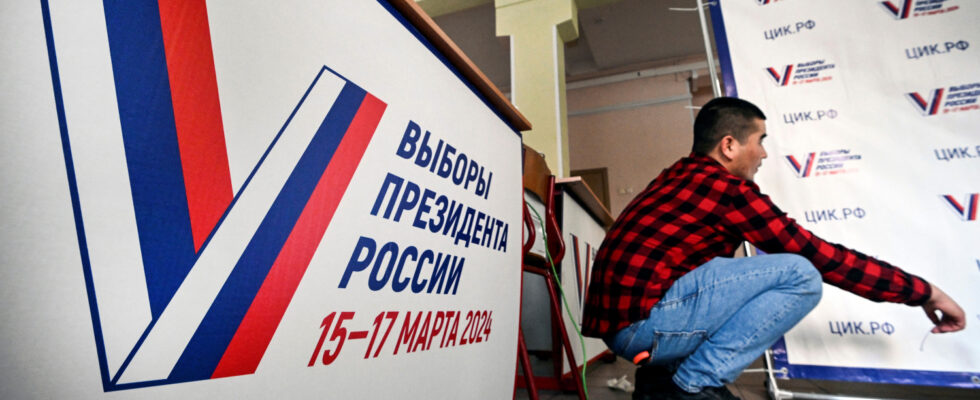Nicolas Tonev with AFP // Photo credit: Alexander NEMENOV / AFP
modified to
7:08 p.m., March 15, 2024
The start of the Russian presidential election, destined to triumphantly re-elect Vladimir Putin, was disrupted on Friday by isolated protest actions and new attacks from Ukraine in the border regions. The vote which runs from Friday to Sunday should see the master of the Kremlin reappointed for an additional mandate of six years, the opposition having been eradicated. However, the vote did not go off without a hitch.
No criticism or opposition is tolerated
Eight people were arrested for damage to polling stations, authorities said in separate statements. A woman was arrested after setting fire to a voting booth in Moscow, according to Russian media. Five people were “taken into custody” in Moscow and the regions of Voronezh, Rostov and Karachay-Cherkessia after spraying ballots into ballot boxes with a “coloring liquid”. One person was arrested for trying to set fire to a ballot box in Khanty-Mansisk in Siberia, and another for trying to light a firecracker in a polling station in the Chelyabinsk region. The prosecutor’s office in the Russian capital warned Thursday against any protests, as no criticism or opposition is tolerated in the country.
A bomb also exploded on Friday without causing any casualties in front of a polling station in the Kherson region, occupied by Russia in southern Ukraine, on the first day of a presidential vote to renew Vladimir Putin. “In Skadovsk, an improvised explosive device was placed in a trash can in front of the polling station. There was an detonation, no casualties,” the regional electoral commission linked to the Russian occupation said on Telegram. According to her, Ukrainian forces also bombed two local electoral commissions without causing any casualties.
On the eve of the election, Vladimir Putin, 71 years old, 24 of whom have been in power, urged his compatriots not to “deviate from the path” in these “difficult” times, referring to the consequences of the assault he launched against Ukraine more than two years ago. The outgoing president faces three candidates without scope who oppose neither the offensive in Ukraine nor the repression which has eradicated all opposition, culminating with the death in prison in mid-February of Kremlin critic Alexeï Navalny.
The only opponent to have attempted to run, Boris Nadejdine, saw his candidacy rejected. Alexeï Navalny’s widow, Yulia Navalnaïa, who vowed to continue her fight, for her part called on Russians to protest by voting for any of the candidates, with the exception of Putin. She also called on Russians supporting the opposition to go to the polling stations at the same time, Sunday at 12 p.m., to show that there are many of them.
An election seen as a “farce” by Ukrainian diplomacy
Voting opened at 8 a.m. Friday on the Kamchatka Peninsula and Chukotka, two remote regions of the Russian Far East. It will end on Sunday at 8:00 p.m. in Kaliningrad, a Russian enclave within the European Union. In a school in Moscow, dozens of residents came as soon as the office opened, under a bright winter sun. Lioudmila, a 70-year-old retiree, says she wants “first and foremost, victory” in Ukraine. For her, this means voting for Vladimir Putin.
Natan, a 72-year-old former worker, also gave his vote to the current president with the hope of seeing more jobs and “that there is no war”. With this election, Vladimir Putin will remain in power until 2030 and will be able to run again to remain in charge until 2036, the year he turns 84. He had the Constitution reformed for this purpose in 2020.
The President of the European Council Charles Michel ironically “congratulated” Vladimir Putin on Friday “for his overwhelming victory in the elections which begin today”. The United States criticized the vote, and Ukrainian diplomacy called on the international community to reject the result of this “farce”.
14 people were killed in Odessa
Ukraine has also increased military pressure on the Russian border regions of Belgorod and Kursk, targeted by a multitude of drone attacks and incursions by military units made up of anti-Kremlin Russians. The Russian army said on Friday that it had repelled multiple incursions by fighters from Ukraine since March 12, admitting to having had to resort to artillery and aviation. Kremlin spokesperson Dmitry Peskov said Friday that these attacks were aimed at “destabilizing the elections.”
A civilian was killed and two others injured in Belgorod in a Ukrainian shelling, according to Governor Vyacheslav Gladkov, who earlier said a fighter also died in another strike. At the same time, drone attacks are increasing in Russian border regions, but also hundreds of kilometers from the front, kyiv having promised retaliation for the bombings that Ukraine has suffered for more than two years.
On Friday, three children were also killed in a Ukrainian strike in Donetsk, an occupied city in eastern Ukraine, according to its pro-Russian mayor Alexei Koulemzin. Russia continues its daily bombings of Ukraine, particularly in Odessa, where at least 14 people have been killed according to local authorities.
